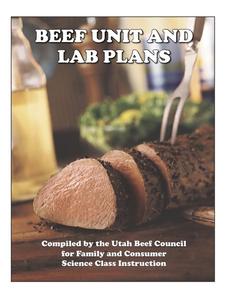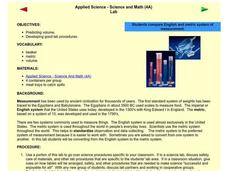Learning Games Lab
How to Use Oil Immersion Microscope
Teach the class how to use a microscope to identify bacteria in food. Scholars explore the different parts of the microscope and learn how to determine total magnification. They walk step-by-step through the procedure of preparing slides...
Curated OER
Lab Safety
This PowerPoint displays safety rules to be followed in a laboratory. General safety, glassware, chemical, electrical, heating safety and first aid are covered
Curated OER
Holiday Fire Safety
Students discuss and view flammable items. In this fire safety lesson, students discuss items that can cause a fire, learn holiday safety tips, watch a holiday safety PowerPoint and discuss what they have learned.
Curated OER
Osmosis and Dialysis
How do you engage pupils in a discussion about osmosis without leaving them overwhelmed? By providing them with the tools to perform an exciting experiment, and they will see osmosis in action! Young chemists and biologists use a potato...
Science 4 Inquiry
Enzymes in Action
Enzymes play a role in almost every function in the human body. Scholars explore three variables related to the use of enzymes. They observe a catalase reaction, experiment with substrates, and examine reactions rates.
Curated OER
Rules of Laboratory Safety
Learners create a list of lab safety statements in small groups. They share their lists with the entire class and the entire group decides on at least seven rules, with accompanying reasons for using proper lab safety.
Curated OER
All About Safety
Students create a safety podcast. For this safety lesson, students in a robotics lab are introduced to the safety rules for each station. They create a podcast about one station explaining the rules with video, graphics, voice and sound...
Alabama Learning Exchange
Safety in the Science lab
High schoolers work in groups to write and produce a video on laboratory safety. They use video equipment correctly and effectively work in groups. They develop basic acting skills with the help of peers and drama teacher.
Curated OER
Microbes Are Everywhere - Biology Teaching Thesis
Students are able to list at 3 rules for operating in a laboratory and to explain why each is important. They are able to identify problems with laboratory scenarios presented by the teachers. Students execute a lab protocol using...
Teach Engineering
Light Intensity Lab
Let there be light. The last installment of a seven-part series has pupils conduct an experiment on light attenuation through different numbers of transparency sheets. They then relate the results back to how X-rays measure bone density.
Utah Beef Council
Beef Unit and Lab Plan
What are the proper methods for cooking various cuts of beef? What are some basic rules regarding meat food safety? Here you'll find 10 lab plans with a variety of beef cookery activities, perfect for a home economics or cooking course.
Science 4 Inquiry
Bubbles and Colors and Smells...Oh My!
A demonstration of elephant toothpaste hooks pupils' interest as they complete multiple experiments with colors, smells, bubbles, and more. By the end, they understand the differences between physical and chemical changes in the world...
Curated OER
Lab Safety
Students investigate the concept of lab safety using a variety of different activities. The equipment necessary is covered. They draw the different types of lab tools using a graphic organizer.
Curated OER
Safety in the Biology laboratory
Students review safety in the biology laboratory. They summarize the rules and safety procedures by completing several activities such as practice questions, taking notes andbecoming familiar with the location of safety equipment.
Curated OER
Applied Science - Science and Math Lab
Although it was written to use in a science class, this measurement lesson is adaptable to Common Core standards in math for measurement and data. Youngsters are introduced to two types of measurement systems. They use both the English...
Learning Games Lab
Testing and Adjusting pH
Pupils learn how to control food spoilage by adjusting the food's pH. They see that one of the most dangerous bacteria can grow in food if people don't handle and store food properly. Using knowledge of the bacteria's preferred pH,...
Learning Games Lab
Controlling Water Activity in Food
Food storage matters! Scholars learn how the amount of water in corn can affect its rate of spoilage. They create a control group, then test three corn samples stored in three different locations for water activity. As a result of the...
Curated OER
Lab Safety
Teaching the importance of safety in the science laboratory is a necessary part of the curriculum.
Curated OER
Science Lesson Plans
Students conduct a variety of exploration activities on various science topics. In this science lesson plan outline, students design a cell encapsulation to hold a specific type of medicine. They give examples of physical and chemical...
Beyond Benign
Green"er" Precipitation Reaction
All sodium carbonate may not have the same amount of carbonate, but it should have the same percent. Learners write and balance an equation to predict the chemical reaction between sodium carbonate and zinc acetate. Through the lab...
Curated OER
Semipermeable Membranes and Bioaccumulation
Beginning biologists place a drop of food coloring into water of differing temperatures to observe the effect on the diffusion rate. They remove the shells from raw eggs and then experiment with osmosis over the remaining membranes....
Curated OER
Pollution or Prevention?
Students examine potential contamination on the environment due to products and by-products of a new industrial process. Students conduct a lab that explores the economic differences between choices of pollution cleanup and prevention.
Biology Junction
Strawberry DNA
Humans eat around 93,205 miles of DNA in an average meal. Scholars learn how to extract DNA from a strawberry using a presentation. It walks through each step and explains why the process works. Comprehension questions encourage...
Curated OER
Applied Science - Science and Math Pre - Lab (Scientific Method)
Students examine science. For this scientific method lesson, students are introduced to what every experiment contains (hypothesis, critical thinking) and how an experiment is conducted. They watch a demonstration and then work...

























